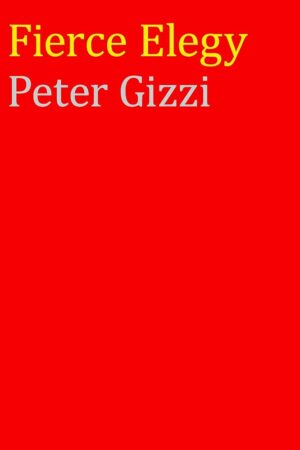Fierce Elegy
by Peter Gizzi
reviewed by James O’Connor
With his last several collections, Peter Gizzi has distinguished himself as one of America’s finest living poets. In his latest book, Fierce Elegy, we find the poet writing at the height of his powers, and the book’s final poem, “Consider the Wound,” is an achievement of singular beauty.
Mark Strand said that all poems are elegies. Gizzi would probably agree. Although he has called Fierce Elegy a single book-length elegy, it doesn’t read that way. Too many of the poems have a different feel and different forms, and the collection also includes love poems like “Roxy Music” and “Ecstatic Joy and Its Variants.” But given the elegiac tone throughout, it seems useless to argue the point. You could also say that Gizzi’s entire body of work is one long elegy.
Gizzi defines the elegy as “a way to transform a broken heart in a fierce world into a fierce heart in a broken world.” On first read, it sounds too neat, but then I came around to it, “fierce” being the right word to describe that part deep within us that survives “the prismatic systems of loss.” Elegies might not help us live, the poet seems to be saying, but they do help us endure. This is what I value in Gizzi’s poetry: the ongoing sense of loss coupled with resistance. In “Dissociadelic,” he writes, “My spirit was broke long ago / So I won’t be broken.” The voice is meditative, searching, and humble, but it can also swerve toward rage, or an ecstatic affirmation of pain: “When you’re brought to your knees, / sing a song of praise.”
In one of his earlier books, Some Values of Landscape and Weather (2003), Gizzi begins a poem with a line from Simone Weil: “there is no better time than the present when we have lost everything.” Gizzi writes in the same tradition as Weil; both writers share a religious sensibility in their approach to the world, and a belief that the self deepens through sorrow. In “Now It’s Dark,” he writes a line Weil surely would have appreciated: “I thought grief is a form of grace.” This might make Gizzi’s poetry sound overly plaintive, but his touch is often light, even funny at times. Reading “Now It’s Dark,” an elegy for the poet’s brother, I laughed out loud when I came upon the lines, “I was in a fever dream / downloading ravens into my skull.” Then there are love poems such as “Ecstatic Joy and Its Variants,” a poem that includes sorrow, rage, and “conversations with the dead.” Simone Weil this is not.
“Consider the Wound,” the last poem from Fierce Elegy, seems to continue “Ship of State,” the last poem from Now It’s Dark (2020), in which the poet addresses his own corpse. In the final section of that poem, the imperative “Consider” is repeated nine times. To take just a few examples, “Consider the corpse … consider the prow … consider the night boat on its way with the soul … consider its passage.” When we come to Fierce Elegy’s “Consider the Wound,” one could say, with some justification, “That sure is a lot of considering.” One might even wish for a more varied rhetorical scaffolding. And yet the imperatives to consider these things—the corpse, the wound, and the passage of the soul—connect the last poems of Now It’s Dark and Fierce Elegy and create a whole out of two very different poems.
“Consider the Wound” begins, “No ideas but in wounds,” an allusion to William Carlos Williams’s famous modernist dictum, “No ideas but in things.” But Gizzi isn’t interested in things; he’s interested in pain. In “Consider the Wound,” the poem still wants the poet in pain, because for Gizzi, “Writing is one thing / Pain is the same thing”:
The mother opens every wound, the wound opens
every wordthe asymmetries of a body in the act of elegy, ungainly
in its pilgrimagetrauma in its genes
a cellular memory of torn events
walking beneath a shadow of warplanes, shadows falling
on the wildflowers and timothy grass
The allusions in “Consider the Wound” are several, and after Williams, the poet turns to the Bible: “wounds of the field, how they grow, they toil not, / neither do they spin.” And then Whitman: “for every wound belonging to me as good belongs to you.” The nod to Whitman is especially felicitous given Whitman’s role as a wound-dresser in the Civil War. Gizzi writes:
To consider wounds that grow through life, illuminate,
and expand into a primal struggleto be able to say, I was here
an everyday annunciation the wound lifts from sorrow,
and it grows, taking years to lovea wound in all its glory
One might question such an affirmation: do we ever truly love loss? It’s hard to know the answer, but calling the simple affirmative “I was here” an “annunciation,” with that word’s religious connotations, shows a wonderful humility—as if to say, maybe grace is nothing more complicated than our ability to endure, our ability to say, I am still here, I have not been destroyed.
Published on May 2, 2024

